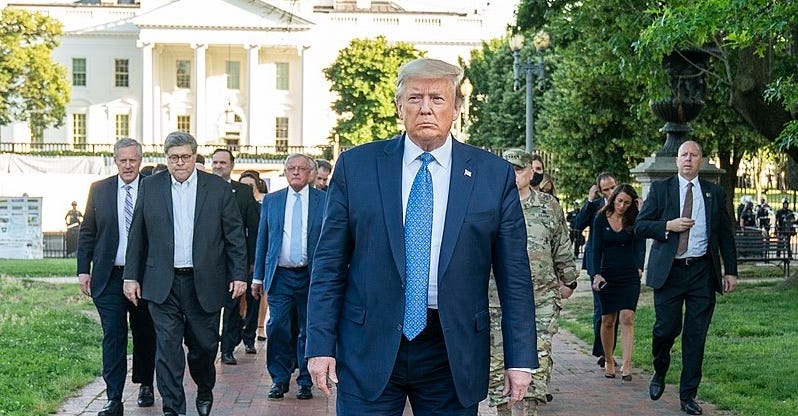Sunday's postcard, and how Donald Trump corralled the evangelicals on abortion
September 15, 2024
Blissful cormorant in late afternoon sunshine on the Spokane River
Hell to pay
“Betrayal is a core character trait of Trump’s. He’s betrayed his wives, his mistresses, his friends, his business associates, people who have worked for him, and his country. There is no person and no cause he will not double-cross. The pro-life movement is only the latest thing to which he has been unfaithful, and it won’t be the last.”—writer and conservative evangelical Christian Peter Wehner
I’ve written about my formative experience on the scorched terrain of abortion before, so if reads familiar, please forgive the echo.
I was barely a teenager, the eldest son in a large Catholic family, and very aware—by osmosis—of my church’s teaching, which is that life begins at conception, without exception. End of argument. In the way that youth can absolve (or at least postpone) one from having to lose sleep over seemingly distant and avoidable conflicts I didn’t dwell on it. The immediate conflicts were all I could handle. I do remember one of my catechism teachers—outside of Sunday school—telling a small group of us that if it came to safeguarding his wife’s life (they’d had two children) or carrying a life-threatening pregnancy to term, he wouldn’t hesitate to save her. I thought that was a brave thing to say, under the circumstances, and I still admire him for it.
But mostly I remember overhearing an animated conversation about abortion in my 7th grade “home room” where we sat three to a table. It was personal in the sense that the three girls, seated a few feet away, were furious about someone they knew who either had, or was planning to have, an abortion.
It was the heat of their anger, the harsh judgment and lack of empathy, that stuck with me. For years. Leaving the church one has grown up in (I literally got off my knees and walked out one day, when I was in my late twenties) is painful. But there were other attitudes and edicts that didn’t square, including the church’s unflinching, misogynic stance that women weren’t fit to become priests. Out of respect for Catholics I still admire, I didn’t stomp out, I just walked out, before the Sunday service began.
The assertion that conception is the instant human life becomes sacred is a respectable and legitimate belief. But it’s a disputable conclusion, and not all religions (Judaism, for example) share it. There are equally sound arguments that life begins at viability, sentiency, or birth and that we should give pregnant women the benefits of the doubts, rather than criminalize their difficult choices. If anything, it favors a respectful zone of privacy in which a woman, her family, and her physicians can make reasoned decisions without fear of prosecution. Suffice to say, I believe as strongly in this right of privacy as I believe in freedom of religion.
Then-President Donald Trump leading an entourage to St. John’s Episcopal Church on June 1, 2020, where he would hold up a Bible to display his resolve during protests of George Floyd’s death. (photo courtesty Wikimedia images)
I also believe in freedom from religion—the practice of people using the levers of democracy to compel broad compliance with their religious beliefs. That’s my opinion. I accept that others don’t share it, and I completely accept that women who believe abortion is wrong should be free to have as many children as they’d like. I also accept that my voice doesn’t matter nearly as much as Samuel Alito’s or Donald Trump’s.
Or Peter Wehner's.
A difference between Wehner and Alito and Trump is that Wehner has integrity. He is one of those souls who entered politics as a young, ardent conservative (he served as a policy wonk and speechwriter in the administrations of Ronald Reagan, George H.W. Bush, and George Bush) and is now jaded, to say the least, with the movement he served for so many years. (One gets the sense, these days, that earnest conservatives like Wehner, Stuart Stevens, Jennifer Rubin, Michael Steele, Nicole Wallace, Steve Schmidt, Tim Miller and Mona Charen are horrified that embers they once stoked in political campfires escaped the fire pit to ignite an inferno of chaos, the smoke from which now blots out the sun.)
The geometry of Trump’s tactics would be laughable if they weren’t so destructive. The rage and violence of the accusations Trump routinely stokes at his rallies (to gales of applause) is about as unChristlike as you can get.
Wehner and I are about the same age, and (small world) were born just miles apart near the Hanford Nuclear Reservation in south-central Washington. I’ve never met him but, if I do, I’ll commend his honesty and clarity.
There is a lightening round pace to the Trump/Harris contest that, if anything, has accelerated since Trump’s implosions during the debate last Tuesday. But, days before that, Wehner wrote a remarkable piece on Trump, evangelicals and abortion for The Atlantic that I would recommend. I disagree with him on a main point. He’s anti-abortion, I’m pro-choice. But I think we are much in agreement about how the Faustian bargain the evangelical, anti-abortion movement made with Donald Trump illuminated its moral hypocrisy while inflicting great harm on our democracy.
Wehner doesn’t get into it but I suspect the evangelical movement’s rush to embrace Trump and join an attack on civil, democratic process and values was driven in part by how quickly public opinion changed on same-sex marriage. In 2004 polling recorded that Americans opposed same-sex marriage by a wide margin—60% opposed to 31% in favor. By 2019, those numbers had flipped, with 61% favoring the legalization of same-sex marriage and 30% opposed. (The Supreme Court’s 5-4 decision in Obergefell v. Hodges, mandating that state’s issue marriage licenses to same sex couples, came in June 2015).
Polling in the spring of 2022—just prior to the Supreme Court’s 6-3 decision overturning Roe v. Wade—found 2/3 of Americans would be opposed to such a change. It is not as though millions of Americans (men and women) missed the extent to which Republicans were eager to help Trump stack the court with anti-abortion judges. He bragged about it, repeatedly, and gassed up the lie that there was broad consensus for the repeal of Roe. But then the backlash showed up in polling and a push (even in conservative states like Kansas and Ohio) to preserve access to abortion. Trump bailed, removing all the anti-abortion measures from the Republican platform at the GOP convention this summer and recently vowing he would now be “great for women and their reproductive rights.” Earlier this morning, Trump’s vice presidential running-mate, J.D. Vance, told NBC’s Kristen Welker that Trump would not sign a nationwide abortion ban if he returns to the White House next year.
On the eve of last Tuesday’s debate between Trump and Harris, New York Times columnist Michelle Goldberg deconstructed Trump’s betrayal of his evangelical, anti-abortion backers. While there were rumblings that Trump’s brazen flip to a more moderate position on abortion would cost him politically, Goldberg makes the case for why it won’t: because Trump warmly welcomed them into politics and then cornered them—giving them no other route to the power they seek over the rest of us.
“(H)e’s transformed the Christian right just as he has the broader conservative movement,” Goldberg wrote, “dethroning serious-seeming figures while promoting those once regarded as flamboyant cranks…in the religious realm, the ex-president has elevated a class of faith healers, prosperity gospel preachers and roadshow revivalists over the kind of respectable evangelicals who clustered around George W. Bush.”
Of course, Wehner is one of those “respectable evangelicals” and like his colleague, former Bush advisor and speechwriter Michael Gerson (who, sadly, passed away two years ago) he feels horrified and betrayed by the evangelical embrace of a man for whom: “Betrayal is a core character trait. He’s betrayed his wives, his mistresses, his friends, his business associates, people who have worked for him, and his country. There is no person and no cause he will not double-cross. The pro-life movement is only the latest thing to which he has been unfaithful, and it won’t be the last.”
The geometry of Trump’s tactics would be humorous if they weren’t so destructive. The rage and violence of the accusations Trump routinely stokes at his rallies (to gales of applause) is about as unChristlike as you can get.
It was clearly the hope of Wehner, Gerson and other evangelicals to prevail in the abortion debate by persuasion, rather than by the erasure of civility and a visceral and actual assault on democracy. The reflection of the betrayal they now feel from Trump is mirrored by the betrayal that many of us feel, knowing that evangelicals still committed to Trump wouldn’t hesitate to bury the Constitution if that’s what it takes to get a national abortion ban.
There is a violence to this I can’t square with my Christian upbringing and, especially, my mother’s unfailing compassion for those battered by life’s inexorable struggles. The separation between church and state set forth in the first clause of the First Amendment is both cornerstone and guide for how democracy and religion can co-exist. When a religious minority conspires to force its will upon a majority, it’s not just democracy that is in trouble. It’s a bad day for religion as well.
—tjc
Today’s Daily Rhubarb is free to everybody but please support the project with an annual, paid subscription at the link below. thanx…










Justin, thanks so much for your comment on yesterday's piece about abortion, evangelicals, and Donald Trump. It's very thoughtful and on point--the IVF dimension to the debate does illuminate the complexity of the issue and the folly, I think, of those trying to impose their will, rather than opening their minds and hearts. Much appreciated.
warm regards, Tim
Timothy,
It's easy for so- called "pro-lifers" to mouth the words that "life begins at conception". But one does not really know one's own values until they are tested against loss, as you mentioned regarding the life of the mother.
I challenge anyone who claims to believe that a human embryo is the moral equivalent of a baby, to consider this: You are a mother of a newborn baby, and you are in the maternity ward. Your baby is in the newborn nursery down the corridor to the left. Down the corridor to the right is the IVF clinic where you have two frozen embryos. A fire breaks out and you have time to save your newborn baby or your two frozen embryos. Which will you choose? Now ask yourself this: How many frozen embryos would you have to save to justify abandoning your newborn baby as the “moral” choice?
Justin StormoGipson, MD